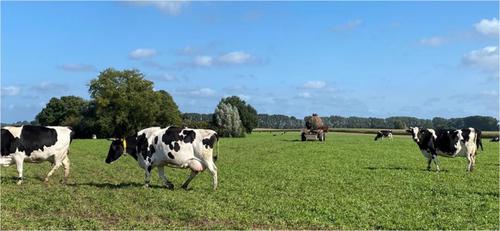Agronomy for Sustainable Development ( IF 6.4 ) Pub Date : 2022-09-13 , DOI: 10.1007/s13593-022-00830-3 Xabier Díaz de Otálora , Federico Dragoni , Agustín Del Prado , Fernándo Estellés , Aurélie Wilfart , Dominika Krol , Lorraine Balaine , Vasileios Anestis , Barbara Amon

|
European dairy production faces significant economic, environmental, and social sustainability challenges. Given the great diversity of dairy cattle production systems in Europe, region-specific concepts to improve environmental and socioeconomic sustainability are needed. Regionally integrated dairy cattle-crop systems emerge as a more resilient and sustainable alternative to highly specialized farming systems. Identifying different dairy cattle production typologies and their potential interactions with fodder crop production is presented as a step in transitioning to optimized agricultural systems. Currently existing typologies of integrated systems are often insufficient when characterizing structural, socioeconomic, and environmental components of farms. We fill this gap in the literature by identifying, describing, and comparing representative dairy cattle production system typologies and their interrelation with regional fodder crop production at the European regional scale. This is a necessary step to assess the scope for adapted mitigation and sustainability measures in the future. For this purpose, a multivariate statistical approach is applied. We show how different land-use practices, farm structure characteristics, socio-economic attributes, and emission intensities condition dairy production. Furthermore, the diversity of regional fodder crop production systems is demonstrated by analyzing their distribution in Europe. Together with identified typologies, varying degrees of regional specialization in milk production allow for identifying future strategies associated with the application of integrated systems in key European dairy regions. This study contributes to a better understanding of the existing milk production diversity in Europe and their relationship with regional fodder crop production. In addition, we discuss the benefits of integrated systems as a clear, viable, and resilient alternative to ongoing livestock intensification in the European context. Identifying interactions between components of integrated systems will facilitate decision-making, the design and implementation of measures to mitigate climate change, and the promotion of positive socio-economic and environmental interactions.
中文翻译:

在欧洲区域范围内确定具有代表性的奶牛和饲料作物生产类型
欧洲乳制品生产面临着重大的经济、环境和社会可持续性挑战。鉴于欧洲奶牛生产系统的多样性,需要针对特定区域的概念来改善环境和社会经济的可持续性。区域一体化的奶牛作物系统成为高度专业化农业系统的更具弹性和可持续性的替代方案。确定不同的奶牛生产类型及其与饲料作物生产的潜在相互作用是向优化农业系统过渡的一个步骤。在描述农场的结构、社会经济和环境组成部分时,目前现有的集成系统类型通常是不够的。我们通过识别、描述、并比较具有代表性的奶牛生产系统类型及其与欧洲区域规模的区域饲料作物生产的相互关系。这是评估未来适应缓解和可持续性措施的范围的必要步骤。为此,应用了多元统计方法。我们展示了不同的土地利用方式、农场结构特征、社会经济属性和排放强度如何影响乳制品生产。此外,通过分析它们在欧洲的分布,证明了区域饲料作物生产系统的多样性。连同已确定的类型,牛奶生产的不同区域专业化程度有助于确定与在欧洲主要乳业地区应用集成系统相关的未来战略。这项研究有助于更好地了解欧洲现有的牛奶生产多样性及其与区域饲料作物生产的关系。此外,我们还讨论了集成系统作为欧洲背景下正在进行的畜牧集约化的明确、可行和有弹性的替代方案的好处。识别集成系统组件之间的相互作用将有助于决策、设计和实施缓解气候变化的措施,并促进积极的社会经济和环境相互作用。欧洲背景下正在进行的畜牧业集约化的和有弹性的替代方案。识别集成系统组件之间的相互作用将有助于决策、设计和实施缓解气候变化的措施,并促进积极的社会经济和环境相互作用。欧洲背景下正在进行的畜牧业集约化的和有弹性的替代方案。识别集成系统组件之间的相互作用将有助于决策、设计和实施缓解气候变化的措施,并促进积极的社会经济和环境相互作用。











































 京公网安备 11010802027423号
京公网安备 11010802027423号